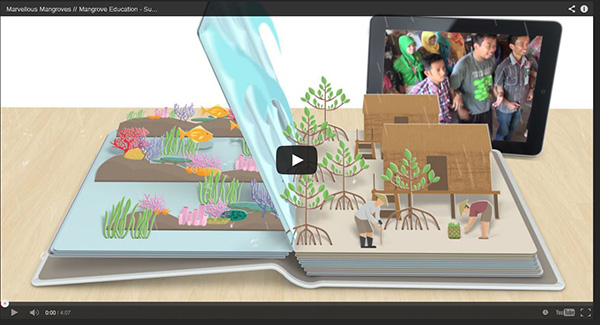FEATURE STORY Mangroves draw scientists to Ancient City
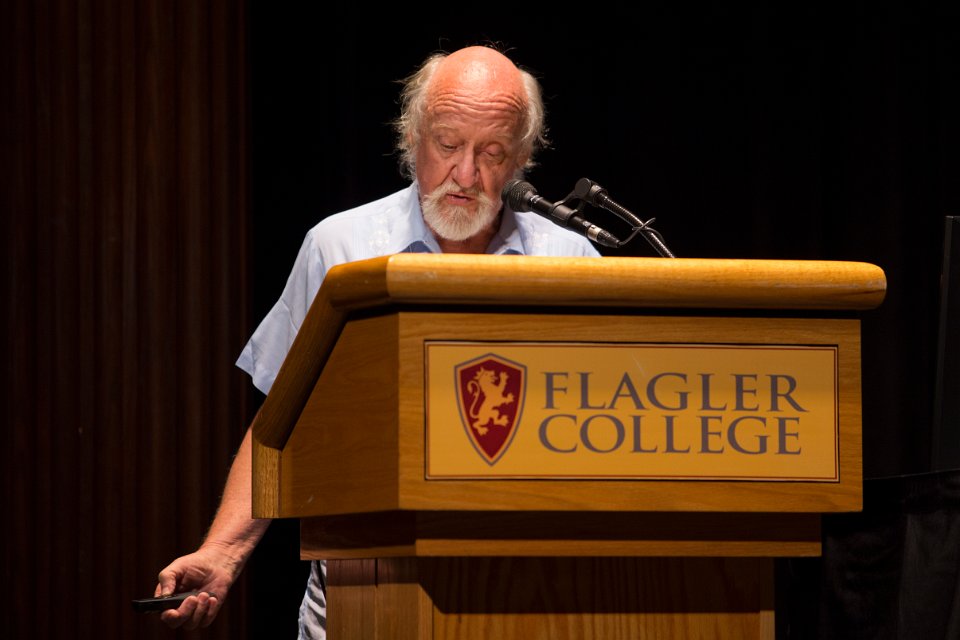
USA – The 4th Mangrove and Macrobenthos Meeting (MMM4) in St. Augustine, Florida, is an international discussion on the causes and consequences of mangrove ecosystem expansion in an ever-changing climate. MAP’s Education Director, Martin Keeley (shown above) was one of the speakers invited to discuss mangroves and their relation to global climate change. Keeley spoke on “Nature Deficit Disorder", and the Marvellous Mangroves curriculum-based, hands-on science program which – since it started in 2001 – has been introduced to thirteen countries worldwide. “It is not enough to teach the true value of mangrove ecosystems through a superficial means of communications. Posters, fliers, displays, websites and one-day stand-alone field trips are not enough if we are going to change the focus and understanding of teachers, students and their communities. In-depth programs like Marvellous Mangroves need to teach core values through traditional education systems to fight Nature Deficit Disorder,” Keeley said. Keeley was one of hundreds of scientists presenting research on mangrove ecosystems during the fourth Mangrove & Macrobenthos Meeting — or MMM4 — at Flagler College, a science conference held every four years in different locations around the world.
READ KEELEY’S PRESENTATION
READ MORE ON MMM4 CONFERENCE ASIA Sundarbans Mangrove Ecosystem Service creates poster for community education program
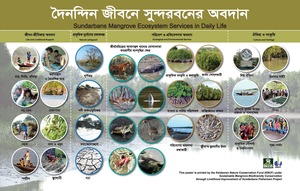
BANGLADESH – Bangladesh Environment and Development Society (BEDS), a grass roots organization in Bangladesh working to promote mangrove conservation and tropical forest education, recently announced the release of a new poster designed to show locals and government officials the important role of mangroves in their everyday life. Md. Maksudur Rahman, Chief Executive for BEDS said the group was exited to share this important educational tool with others interested in mangrove environments. The poster reflects the roles mangroves play in everyday life including life and livelihood, natural safeguards, environmental service and cultural heritage. VIEW POSTER World community urged to stand up for Sundarbans
BANGLADESH – Sundarbans, the world’s largest mangrove forest, provides protection to millions of Bangladeshis against devastating cyclones, but the massive Rampal coal plant is now threatening its delicate ecology. Major spills have happened before and the next accident is right around the corner. Yet, the Bangladesh government is relentlessly pursuing major industrial projects like the coal plant that will generate enormous volumes of toxic waste and leave the forest waterways vulnerable to future hazardous spills. UNESCO is concerned about the World Heritage site, and if enough of us raise our voices now, we can persuade them to officially declare the Sundarbans as a "World Heritage in Danger" and get the Bangladesh government to protect the forest. Let’s send a deafening call to the chair of UNESCO’s key committee to save this global treasure!Click here to message your friends on Facebook
More Information:
A new power plant could devastate the world’s largest mangrove forest (Washington Post)
Rampal power plant: A project of deception and mass destruction (BDNews24)
Threat to Sundarbans Concerns UNESCO (The Financial Express)
List of World Heritage in Danger (UNESCO) MAP joins Mapping and Monitoring of Mangrove Ecosystems Workshop in Viet Nam

VIETNAM – Two MAP-Asia staffers, Ms. Jaruwan Enright and Mr. Udomsak Pariwatpan, joined a four day workshop on “AFOLU Working Group Technical workshop: Advancing the mapping and monitoring of mangrove ecosystems” held in Ho Chi Minh City, Vietnam on 9-12 August 2016. The workshop was organized by USAID through the following programs; SERVIR-Mekong, SilvaCarbon and SWAMP and Low Emissions Asian Development (LEAD). There were more than 60 participants represented from government, civil society agencies and researchers who are responsible and working on coastal management and remote sensing for mapping mangrove forest in Southeast Asia. READ MORE Editor’s Note: Sea cows are an integral part of tropical forest ecology and play an important role in health of sea grass beds and mangrove environments.
Kai and Junior pioneer return of sea cows to the Caribbean a century after local extinction

SINGAPORE – two manatees or sea cows started a journey that will take them on a charter flight half way round the world, from where they were bred in Singapore to their ancestral lands in the Caribbean. Sea cows—closely related to the dugongs found in Australian tropical waters—were wiped out in the Caribbean in the early 1900s as a result of hunting pressure. On August 8, Kai and Junior, two young male sea cows born in a special breeding program at Wildlife Reserves Singapore, started a 30-hour journey in a specially chartered plane to Guadalupe, a French island territory in the southern Caribbean Sea. The pioneer pair of sea cows are part of an ambitious long term conservation program to return manatees to the wild in the Caribbean, where they have remained an important part of local folklore. READ MORE Sri Lankan mangroves respond to conservation plan

SRI LANKA – A year after Sri Lanka launched a mangrove conservation plan with funds from a U.S. conservation group about half of its 37,000 hectares of mangrove forests are in a various stage of revival, officials say. With US$ 3.4 million from the Califronia-based Seacology and manpower and other support from the Sri Lankan government, some 283 community organisations have been engaged in the work of conserving and replanting mangrove forests. The national conservation body, Small Fisheries Foundation, is the local implementing partner. Over the next four years 1,500 community groups will be looking after existing mangroves and also replanting an additional 3,000 hectares. Adding to the efforts, the Sri Lanka Navy has deployed its personnel to help with the planting of over 36,000 mangrove trees. “Nations within and without the region are taking notice of the Sri Lanka mangrove conservation programme,” Seacology executive director Duane Silverstein said. READ MORE Sri Lanka success whets international appetite for mangrove conservation
SRI LANKA – Sri Lanka's pioneering nationwide program to save its damaged mangrove forests is bearing fruit a year on, prompting the U.S. conservation group backing it to look for another island country to launch a similar effort. Duane Silverstein, executive director at California-based Seacology, a non-profit that protects island habitats, said he was planning to visit a candidate island state in the Caribbean in the next month. “This project, if it happens, is most definitely inspired by the success (in) Sri Lanka,” he told the Thomson Reuters Foundation, declining to name the potential project site as negotiations were ongoing. From the late 1980s into the 1990s, the destruction of Sri Lanka's mangroves had official sanction, as the government handed out public land to large companies to clear for shrimp farms along the northwest coast. “We were helpless – there was nothing we could do. Earth movers would come in and clear tracts overnight that had taken hundreds of years to grow,” said Douglas Thisera, director of conservation at the Kalpitiya-based Small Fishers Federation of Sri Lanka (Sudeesa), which is partnering on the mangrove scheme. READ MORE Mangroves destruction: Zero conviction in 150 cases in past one year
INDIA – As unabated destruction of mangroves continues across Maharashtra, authorities have failed to rein in offenders. Statistics reveal that there hasn’t been a single conviction in 150 cases in the past one year, and inquiry in more than 33% cases is still pending. As per data available with the Konkan divisional commissioner’s office, more than 50 cases of mangrove destruction between July 2015 and August 2016 remain pending. Of these, 22 cases were from suburban Mumbai, 12 from Thane, nine from Navi Mumbai, five cases from Mira-Bhayander and the remaining from Sindhudurg and Raigad districts. Moreover, fewer than 10 first information report (FIR) were filed against offenders in the Konkan region. READ MORE Mangrove program nurtures Siargao’s ecosystems

PHILIPPINES – Things are certainly looking up in the rustic southern town of Del Carmen in Surigao del Norte which has been experiencing a dramatic turnaround in negative environmental practices. Thanks to the growing ecological awareness brought about by Shore It Up, a comprehensive marine ecosystem and coastal resource program of the Metro Pacific Investment Corp. (MPIC) which commenced in 2013. The program’s centerpiece is the Mangrove Protection and Information Center, a hub for the rehabilitation and nurture of the coastal ecosystem. Located in Siargao Island, the coastal town is home to a 4,000-hectare contiguous mangrove forest, the biggest of its kind in the archipelago. The program has been working closely with various agencies and organizations across the country to preserve the mangrove forests, which protect coastal communities against storms and serve as habitats for aquatic life. According to Del Carmen Mayor Alfredo Coro II, the program brought about a 95% threat reduction of mangrove cutting from 2014 up to the present has been noted, based on visual observation and bio-physical assessment conducted by SIKAT. READ MORE AMERICA MAP members slated to speak at World Conservation Congress
  USA – MAP’s Eexcutive Director, Alfredo Quarto and MAP Asia Field Project Manager Jaruwan Kaewmahanin Enright (“Ning”) have been invited to speak on separate topics at the IUCN hosted “World Congress on Nature” in Hawaii this September. Quarto co-organized a workshop titled “Moving Towards a Sustainable Mangrove Economy”. The purpose of this workshop is to show how "profitable" mangrove protection is, and how much modern societies could gain on an economic, social and ecological level. Jurawan will speak at “Ecosystems and Society in a Changing World”. The discussion will focus on the scientific underpinnings and practical implementation of Ecosystem-based disaster risk reduction (Eco-DRR) and Ecosystem-based Adaptation (EbA) as effective nature based solutions to coastal hazards and vulnerabilities and community sustainability around the world. READ MORE Efforts are underway to replant and re-propagate red mangrove all across South Florida

USA – It is impossible to underestimate the value of the red mangrove forests of Florida’s Sanibel and Captiva islands. To start with, the early formation of both islands were in large part dependent on these trees catching and trapping the sand and sediments in their extensive root systems. Without red mangroves there might not be a "Living Sanibel" because there might not be a Sanibel or a Captiva to write about. Beyond their island and land building capabilities, red mangroves offer an extensive list of other benefits to the estuarine and marine eco-systems. To begin with, every acre of mangroves produces 3.6 tons of leaf litter per year. This litter falls into the tidal waters and helps to feed a host of living organisms, from the micro-organisms that break down this detritus to oysters, barnacles, crabs, shrimps and the fishes that feed on them. An estimated 75 percent of all of Southwest Florida's game fish and 90 percent of all commercial species depend on the mangrove system for cover and nutrients. READ MORE Mangroves as protection from storm surges in a changing climate
USA – Adaptation to climate change includes addressing sea level rise and increased storm surges in many coastal areas. Mangroves can substantially reduce the vulnerability of the adjacent coastal land from inundation and erosion. However, climate change poses a large threat to mangroves. This paper quantifies the coastal protection provided by mangroves for 42 developing countries in the current climate, and a future climate change scenario with a one-meter sea level rise and 10 percent intensification of storms. The benefits of the coastal protection provided by mangroves are measured in terms of population and gross domestic product at a reduced risk from inundation; the loss of benefits under climate change is measured as the increased population and gross domestic product at risk. The findings demonstrate that although sea level rise and increased storm intensity would increase storm surge areas and the amounts of built resources at risk, the greatest impact is the expected loss of mangroves. DOWNLOAD WHITE PAPER Shrimp import refusals spike over antibiotics
USA – While the farmed shrimp industry in Asia has made progress on antibiotic use, the United States Food and Drug Administration (FDA) is refusing a higher number of shrimp imports – particularly from India – over banned antibiotics. Out of the 197 seafood shipments that FDA refused entry to in July, 18 (9.1 percent) were shrimp products that contained banned antibiotics. And, from January through July 2016, FDA has refused 79 shipments because of veterinary drug residues. “Even if no further refusals are made by the agency for the remainder of this year, the total amount of entry lines refused already exceeds the annual total of nine of the last fifteen years,” said the Southern Shrimp Alliance, a coalition of shrimp harvesters, processors and importers in eight U.S. states. READ MORE OCEANA A Remote Pacific Nation, Threatened by Rising Seas

KIRIBATI – For years, scientists have been predicting that much of Kiribati may become uninhabitable within decades because of an onslaught of environmental problems linked to climate change. And for just as long, many here have paid little heed. But while scientists are reluctant to attribute any specific weather or tidal event to rising sea levels, the tidal surge last winter, known as a king tide, was a chilling wake-up call. Pacific island nations are among the world’s most physically and economically vulnerable to climate change and extreme weather events like floods, earthquakes and tropical cyclones, the World Bank said in a 2013 report. While world powers have summit meetings to negotiate treaties on how to reduce and mitigate carbon emissions, residents of tiny Kiribati, a former British colony with 110,000 people, are debating how to respond before it is too late. READ MORE LAST WORD(S) MAP says “Goodbye and Thank You!” to a dedicated volunteer Dear friends, Today is my last day here at MAP-Asia. It has been a pleasure working with you guys in person, and through the screen! This experience has changed my perspective greatly. I am so fortunate to have been apart of your team (however brief). Take care, and keep up all the amazing work! Maria Maria Savage
MAP-Asia Office Development & Field Project Assistants (Interns)
******************************************
Mangrove Action Project (MAP)
MAP – Asia Office
1/31 B-206 Chang Residence Building (Formerly Yaotak)
Vienkapang Road
Amphur Muang, Trang 92000
T H A I L A N D Thank you for your support Maria. We appreciate your efforts. Good luck with where ever life leads you
BACK TO TOP
Not yet a subscriber? Click here to subscribe. Please cut and paste these news alerts/ action alerts on to your own lists and contacts. Help us spread the word and further generate letters of concern, as this can make a big difference in helping to halt a wrongdoing or encourage correct action. ACTION ALERTS WANTED: MAP News is looking for links to calls to actions/petitions and letter writing campaigns on mangrove issues, tropical coastal communities and other related topics. Not all submissions can be selected, but we look forward to hearing about your work and want to let our readers' voice be heard!
Email submissions to news@mangroveactionproject.org | Action Alerts: The world's largest mangrove forest is in danger from a massive coal plant.
UNESCO can put pressure on India and Bangladesh to protect the forest, but they need to see that people around the world are speaking out. Click here to add your voice. Tell the Ex-Im Bank: Don't let Big Coal wreck mangrove forests
The U.S. Export-Import Bank is considering using US tax dollars to pay for two coal plants in Bangladesh. These projects would wreck the world’s largest mangrove forest and devastate the Bengal tigers that live there. We need your help to stop it! Our new short documentary, Reducing the Risk of Disaster through Nature-Based Solutions : Mangroves 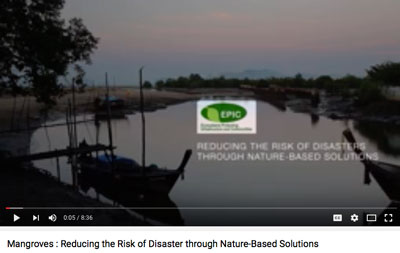
CALL FOR CHILDRENS ART: We invite all primary school children from tropical and sub-tropical nations, and whose schools are located near mangroves, to create art telling us "why mangroves are important to my community and me?” Selected winners will be published in the 2017 calendar to be distributed internationally READ MORE
Tell Dam Builders to Pull Out of Agua Zarca Dam! For years, critics of the Agua Zarca dam project in Honduras have been targeted by a campaign of violence, intimidation and outright murder. Then, on March 2, Berta Cáceres – vocal critic of the Agua Zarca Dam, Goldman Prize winner and mother of four – was brutally murdered in her home. ENOUGH IS ENOUGH Sign out Petition Tell Red Lobster its "Endless shrimp" deal is damaging and unfair to the workers SIGN THE PETITION
Mangroves: Guidebook to Malaysia – available for download here
Mangrove rehabilitation in Asia – Local Action and cross-border Transfer of Knowledge for the Conservation of Climate, Forests and Biodiversity VIEW VIDEOS HERE Volunteer Opportunities with Mangrove Action Project CLICK HERE
STOP PLANTING MANGROVES ON SEAGRASS BEDS _ A CALL TO ACTION What is CBEMR? Easy to follow fact sheet – CLICK HERE SHARE MAP'S VISION
CLICK HERE to watch short introductory video. Together we can work "at the roots of the sea". Join us in saving our beautiful country!
We hope you have been following the ongoing battle in Bimini, Bahamas.
We are in need of your help more than ever Click here
Exclusive Interview with Alfredo Quarto, Co-Founder and Executive Director of Mangrove Action Project – See more
Marvellous Mangroves Curriculum Marvellous Mangroves Curriculum in Bangladesh – WATCH VIDEO MARVELLOUS MANGROVES IN BRAZIL
En Portuges Check out our presentation for more details on Marvellous Mangroves “Education In The Mangroves" can now be seen on the PhotoPhilanthropy website here! Read this 10 page history of the development of MAP’s educational curriculum VIEW DOCUMENT
Article in Canada's Green Teacher Magazine – Read More
FREE MAP Mangrove e-cards CLICK HERE
 MAP’s e-Cards offer you a unique way to spread the word about MAP’s good works, while sharing beautiful photographs of the mangroves
Donate to MAP via Paypal
Giving could never be easier
It’s the action, not the fruit of the action, that's important. You have to do the right thing. It may not be in your power, may not be in your time, that there'll be any fruit. But that doesn't mean you stop doing the right thing. You may never know what results come from your action. But if you do nothing, there will be no result. —Mahatma Gandhi
Green Planet Fundraising Assists MAP – LEARN MORE
MANGROVE ISSUES The importance of restoring mangroves in an effective, long-term manner. Mangrove CBEMR video – VIEW Question Your Shrimp Consumer/Markets Campaign! WATCH VIDEO Mangrove Restoration in Asia – Watch Short Video 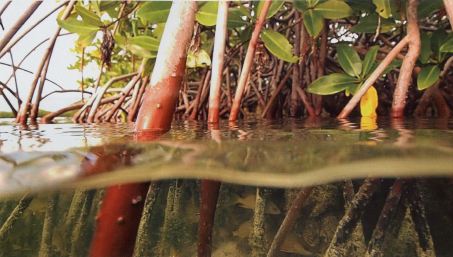
READ A MOSAIC OF LIFE Peek into the underwater world of mangroves, "womb of the sea." By Liz Cunningham Photos By Wes Matweyew and Liz Cunningham
"Question Your Shrimp" Campaign Learn more about the affects of the shrimp industry on mangroves by visiting our blog Editor’s Note: Mangrove Action Project’s Executive Director, Alfredo Quarto was interviewed about shrimp by Green Acre Radio’s Martha Baskin Information sheds clear light on shrimp-mangrove connection

Not yet a MAP News subscriber?
Click here to subscribe.
Note to Our Readers:
We strive to keep active links in our newsletter. However, due to circumstances beyond our control, occasionally links to stories may become broken. If you find a link to a story is not functioning, please cut and paste the headline into your browser search bar. In most cases you should be able to locate the original story.
Help Mangrove Action Project through your recycled E-Waste. List of Accepted E-waste Items:Injet Cartidges, Cell Phones, Pagers, GPS, Radar Detectors, Mobile Hot Spots, Calculators, eBook Readers, iPods/MP3 players, Digital/Video Cameras/Camcorders, PDAs, iPads/Tablets/Laptops, Video Game Consoles, Handheld Video GamesVisit the Mangrove Action Project recycle website Click on the recycle button then click on the Download Shipping Label, and follow the instructions. 
|














